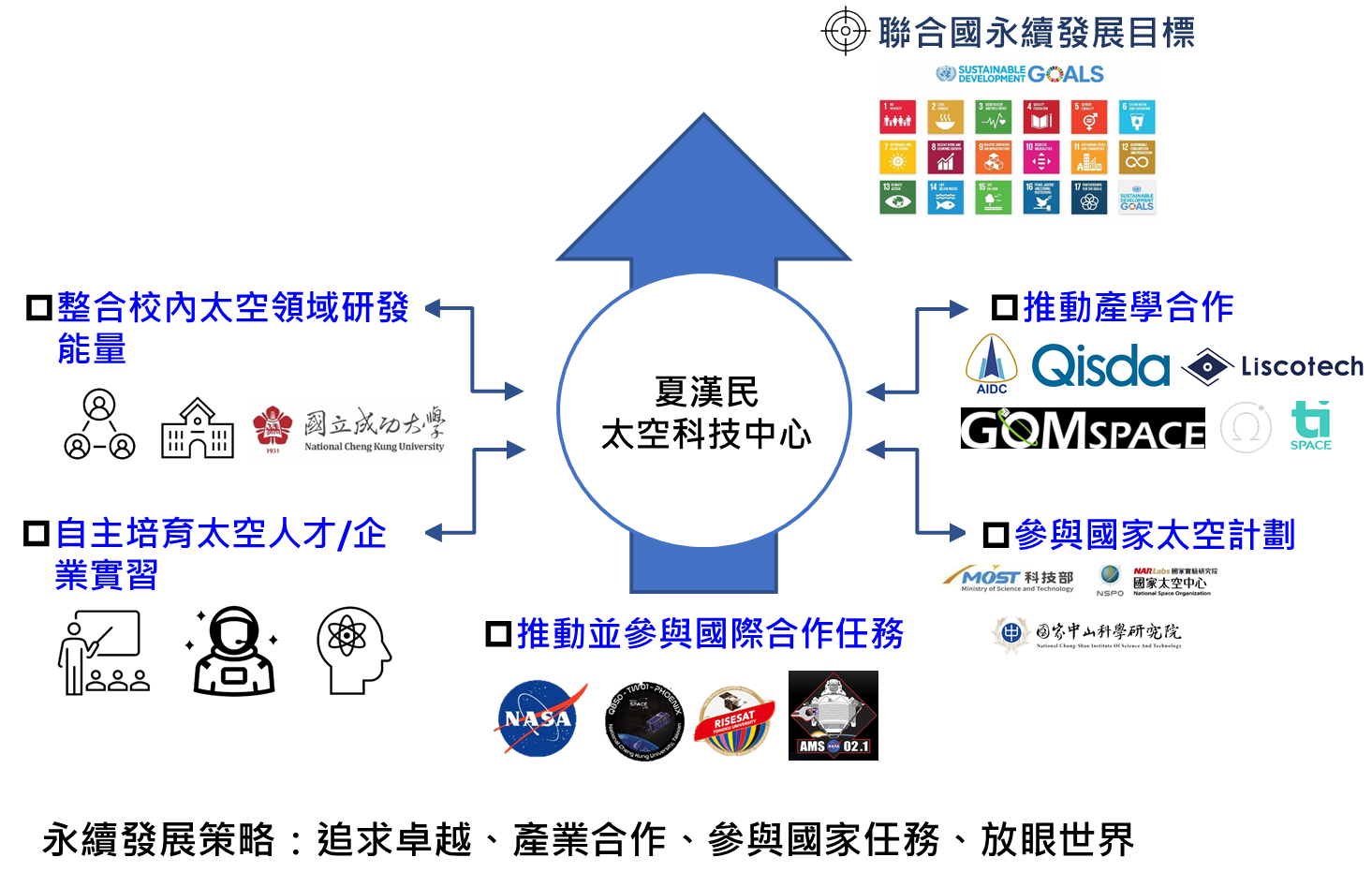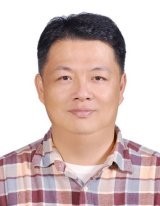Launch NCKU to Space! Overview of Han-Min Hsia Space Science and Technology Center
|
Launch NCKU to Space! Overview of Han-Min Hsia Space Science and Technology Center In view of the significance of the space industry, which is one of the six core strategic industries of Taiwan, and the need for cross-sectoral collaboration and cultivation of interdisciplinary talent for the development of space technology, Han-Min Hsia Space Science and Technology Center (the “Center”) is committed to synergizing the space research teams of the College of Engineering, College of Computing and College of Sciences of NCKU to further the progress of leading-edge space science and engineering, cultivate Gen Z space talents, participate in and promote international cooperation in space, implement the space initiatives of Taiwan, and enhance the competitive advantages of the space industry of Taiwan through industry-university collaboration and transformation of scientific research achievement. |
|||||||
| ______________________________________________________________________________________________________________________ | |||||||
|
The Center was established by NCKU in March 2022 in commemoration of the contribution of Han-Min Hsia, former president of NCKU (1932-2021), to space research in NCKU and Taiwan. Dr. Hsia established the Institute of Aeronautics and Astronautics in 1983 to support outstanding overseas scholars who return to Taiwan to teach and contribute to the development of space science and technology in Taiwan. During his tenure as president of NCKU, Dr. Hsia established the Department of Aeronautics and Astronautics at the Tzu-Chiang Campus and the Aeronautics and Astronautics Laboratory at the Guiren Campus successively, thus laying a solid foundation for space research of NCKU. During his tenure as Minister of the National Science Council, Dr. Hsia continued his efforts to promote space research of Taiwan. In addition to the launch of the first 15-year Long-term National Space Technology Development Program, he established the Preparatory Office of the National Space Program (which is known as the National Space Organization now). The center was named after Dr. Hsia in the hope that it will carry on the undertaking of the pioneers and continue to promote space science and technology of NCKU and Taiwan. Since the inception in 1983, Han-Min Hsia Space Science and Technology Center has evolved into one of the only two campus-based research centers in Taiwan that can independently build satellites and the only campus-based research center in Taiwan that has successfully launched satellites into orbit kept operation. The space science and engineering specialties of the Center include propulsions, satellite buses, mission payload, fundamental science research, and data analysis and application. Unlike other universities that rely on one single department to develop space technology, NCKU has built a tightly integrated team of faculty and students from the Department of Aeronautics and Astronautics, Department of Geomatics, Department of Electrical Engineering, Department of Physics and Department of Earth Sciences in the College of Engineering, College of Computing and College of Sciences. A multidisciplinary research center is essential to boosting the development of space science and engineering and facilitating collaboration between research institutions, universities and industry. As one of the top academic institutions in Taiwan, NCKU is duty-bound to promote cutting-edge space science and engineering in response to the call of the state leaders who have made the space industry one of the six core strategic industries in Taiwan. To promote space research, the Center will integrate innovative research resources in the field of space science and engineering in NCKU, and strengthen cooperation among the existing research teams while actively seeking for cooperation with research teams that are not engaged in the field of space science and engineering for the time being. Hopefully, by complementing the experiences of the existing research teams with the innovative ideas and resources of other research teams, the Center will make major breakthroughs in space research, which can be achieved through the implementation of space initiatives of Taiwan and multidisciplinary collaboration and can build influence in specific fields. Since 2017, NCKU has offered the Interdisciplinary Course in Space Science and Engineering to cultivate interdisciplinary talents. Students have often participated in international satellite design contests and won awards. In the future, the Center will continue to improve the course, bring in new members that are passionate about space technology into research teams and deepen industry-university collaboration to provide passionate and practical Gen Z talents for the space industry that is in urgent need of such talents. In terms of international cooperation in space, NCKU has successfully completed several international missions initiated by NCKU and Taiwan, and has accumulated extensive experiences. It has become common practice to rely on international cooperation to complete a space mission that is unattainable for a single research institute. On the one hand, it is more cost-effective and affordable for a university. It does not have to be sponsored by a national space agency. On the other hand, international cooperation makes such a mission highly visible in the worldwide science community. Therefore, we will continue to step up international cooperation in the future. In terms of industry-university collaboration, the Center will provide a platform for faculty and students in related areas of study to work together and address critical challenges in the industry. Meanwhile, the Center will strive to apply the research results of NCKU in the space industry through technology transfer and joint development. The vision of the Center is to leverage space research and space technology development to improve the livelihood of people, secure health and well-being for all, and help meet the UN’s SDGs. NCKU is ready to participate in the various space initiatives of Taiwan and build influence in the space industry while synergizing the efforts of faculty of different colleges and departments to contribute to talent cultivation, international cooperation and industry development. We are looking forward to more teachers and students joining us in launching NCKU to a higher altitude.
|
|||||||
| ______________________________________________________________________________________________________________________ | |||||||
|
|||||||
subscribe E-news
Vol.34 NO.2(2022.4)-4 Author information








